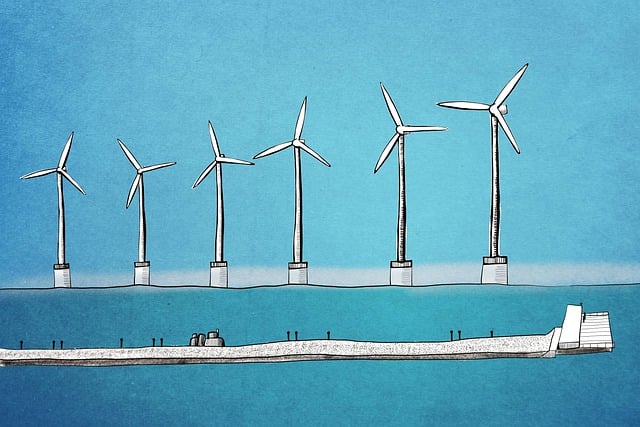Energy-efficient water heaters powered by electricity, natural gas, or propane reduce energy use and bills. Heat pump systems and tankless heaters minimize power consumption. Consumers should consider initial costs, running expenses, and environmental impact when choosing a water heater. Electric models offer efficiency, gas provides faster heating for larger homes, while propane offers flexibility. Tankless heaters heat water on demand, saving energy. Solar systems use solar power as a fuel type. Hybrid and condensing models further enhance efficiency.
Looking to slash your energy bills and reduce your environmental impact? Opting for an energy-efficient water heater model is a smart move. This guide navigates the landscape of high-efficiency heaters, exploring various fuel types like electric and heat pump models, gas options with enhanced efficiency, tankless technology, solar systems, and cutting-edge hybrid/condensing technologies. Discover how these innovations can transform your home’s hot water usage.
- Understand Energy-Efficient Water Heaters
- Explore Electric and Heat Pump Models
- Examine Gas Water Heater Efficiency
- Consider Tankless Water Heaters
- Evaluate Solar Water Heating Systems
- Learn About Hybrid and Condensing Technologies
Understand Energy-Efficient Water Heaters

Energy-efficient water heaters are designed to reduce energy consumption and lower utility bills, making them an eco-friendly and cost-saving choice for many households. These models utilize various fuel types, such as electricity, natural gas, or propane, but incorporate advanced technologies to minimize power usage. For instance, heat pump water heaters transfer heat from the air to warm water, while tankless heaters provide hot water on demand, eliminating the need for continuous heating.
By understanding these energy-efficient options, consumers can make informed decisions when selecting a new water heater. Each fuel type offers unique advantages and considerations, such as initial cost, running expenses, and environmental impact. Electric heaters are generally efficient but may have higher installation costs, while gas models provide faster heating and are more suitable for larger households. Propane heaters offer flexibility and power, making them ideal for remote locations or areas with limited access to natural gas lines.
Explore Electric and Heat Pump Models

When considering energy-efficient water heaters, electric and heat pump models stand out as excellent options. These models offer a significant advantage over traditional gas or oil heaters by using electricity as their primary fuel type. Heat pumps, in particular, are highly efficient as they transfer heat from one location to another, providing hot water with less energy input compared to conventional heating methods.
Electric water heaters are straightforward and easy to install, making them a popular choice for many households. They eliminate the need for complex ventilation systems often required by gas heaters, simplifying both installation and maintenance processes. Moreover, electric models can be further enhanced with smart thermostats and tankless technology, ensuring efficient hot water supply without excessive energy wastage.
Examine Gas Water Heater Efficiency

When considering energy-efficient water heater models, it’s crucial to examine options based on different fuel types. Gas water heaters, for instance, offer a range of efficiency levels measured in percentages. Look for models with high Annual Fuel Utilization Efficiency (AFUE) ratings—the higher, the better. A typical gas water heater has an AFUE of 70%, but modern condensing models can surpass 95%. This means they convert more fuel into usable heat, reducing energy waste and lowering your utility bills.
Furthermore, consider tankless or on-demand gas water heaters, which only heat water when needed. Unlike traditional tanks that maintain a constant hot water supply, these models eliminate standby heat loss, further enhancing efficiency. In terms of fuel type, gas remains a popular choice for its convenience and relatively lower initial costs compared to electric or solar options. However, as you explore energy-efficient models, compare AFUE ratings and consider the overall environmental impact based on your region’s energy mix.
Consider Tankless Water Heaters

Tankless water heaters, also known as on-demand or instant water heaters, offer a compelling alternative to traditional storage tank models. Instead of keeping a large reservoir of hot water heated at all times, these heaters heat water only when needed. This not only saves energy but also eliminates the risk of running out of hot water mid-shower, a common concern with tanked heaters.
When choosing a tankless model, consider the fuel type that best suits your needs and budget. Electric tankless heaters are generally more efficient and cost-effective to operate than gas-powered ones, as they don’t have a pilot light or burn fuel constantly. However, gas tankless heaters may be more suitable for larger households or locations without easy access to electrical outlets, as they provide faster heating times and can be installed outdoors.
Evaluate Solar Water Heating Systems

Solar water heating systems are an excellent option for those looking to reduce their energy consumption and save on bills. These systems harness the power of the sun, using it as a renewable and sustainable fuel type to heat water. They’re particularly effective in regions with ample sunlight, offering a cost-efficient alternative to traditional water heaters.
When evaluating solar water heating, consider both active and passive systems. Active systems use pumps to circulate water through solar collectors, making them suitable for colder climates. Passive systems, on the other hand, rely on natural thermal migration, requiring less maintenance but being better suited to milder temperatures. This green energy approach not only reduces your environmental impact but also provides long-term savings.
Learn About Hybrid and Condensing Technologies

Water heaters are a significant home appliance, and choosing an energy-efficient model can save you money and reduce your environmental impact. Two advanced technologies to consider are hybrid and condensing water heaters. Hybrid models combine electric and gas heating, with the electric element kicking in when the gas burner isn’t needed, offering greater efficiency. Condensing water heaters, on the other hand, capture heat that would otherwise be wasted and use it to heat water, significantly boosting their energy efficiency compared to conventional models. These technologies are particularly effective for homes using specific fuel types, enhancing overall heating performance and contributing to a more sustainable future.
